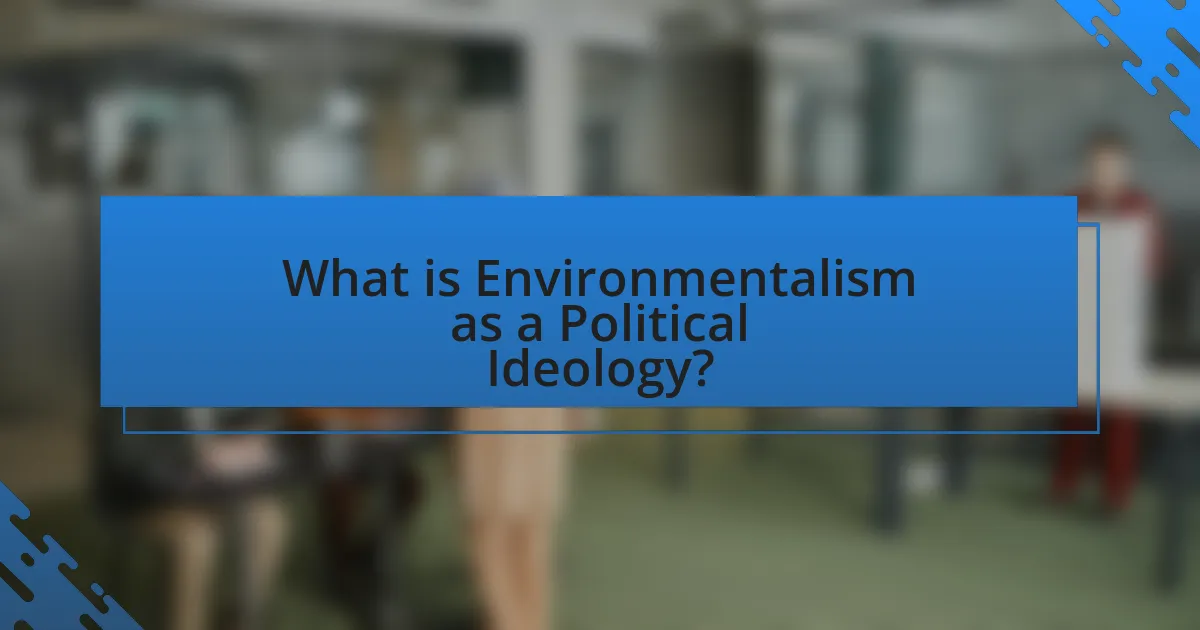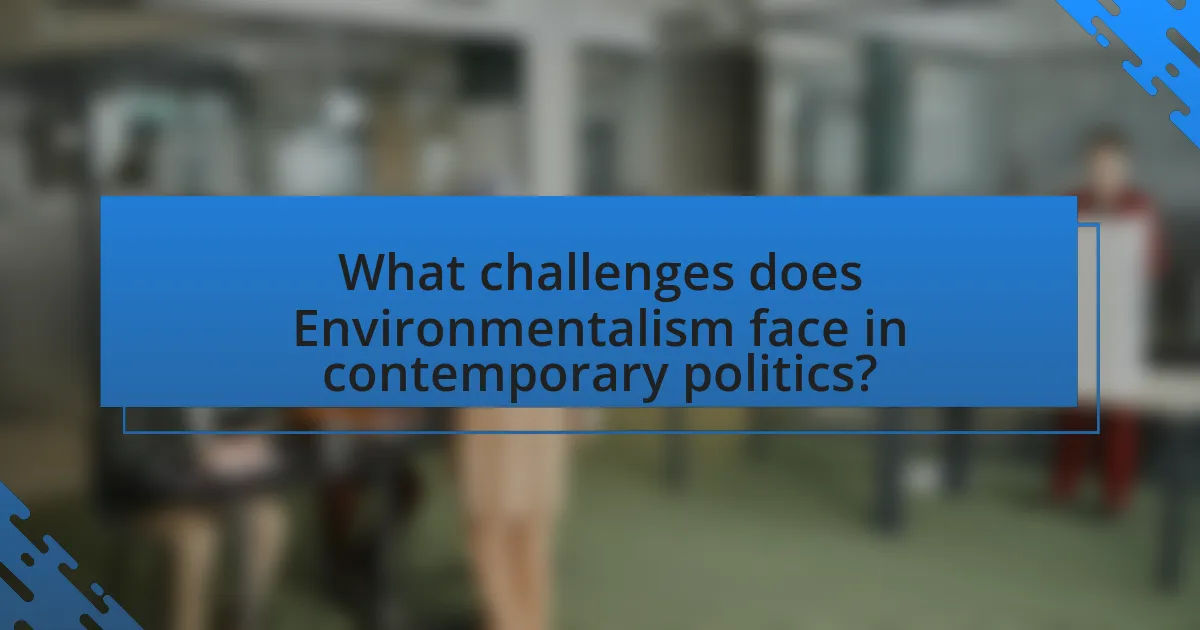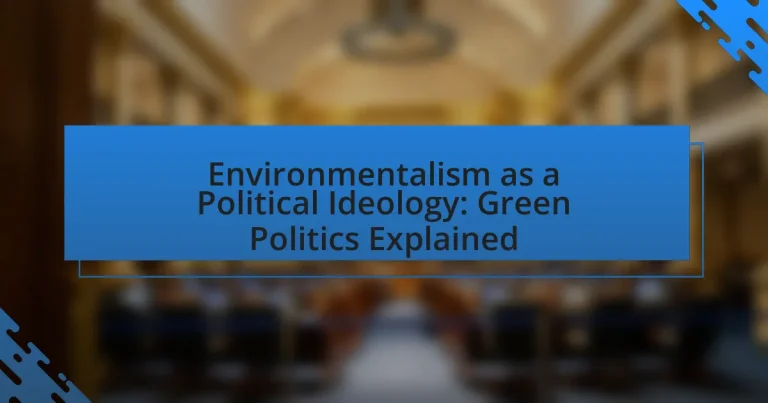Environmentalism, as a political ideology, emphasizes the protection of the environment and the promotion of sustainable practices within political frameworks. This article explores the emergence of environmentalism, its historical influences, and key figures in the development of Green Politics. It outlines the core principles of environmentalism, such as sustainability and social justice, and discusses how these principles shape political agendas and influence policy-making. Additionally, the article addresses the challenges environmentalism faces in contemporary politics, the role of economic interests, and the strategies that can enhance the effectiveness of Green Politics. Finally, it highlights practical steps individuals can take to support environmentalism in their daily lives.

What is Environmentalism as a Political Ideology?
Environmentalism as a political ideology emphasizes the importance of protecting the environment and promoting sustainable practices within political frameworks. This ideology advocates for policies that address ecological issues, such as climate change, biodiversity loss, and pollution, often prioritizing environmental health over economic growth. Historical movements, such as the establishment of Earth Day in 1970 and the formation of the Green Party in various countries, illustrate the growing political recognition of environmental concerns. Additionally, research indicates that environmental policies can lead to long-term economic benefits, as seen in studies showing that investments in renewable energy create jobs and reduce healthcare costs associated with pollution.
How did Environmentalism emerge as a political ideology?
Environmentalism emerged as a political ideology in the mid-20th century, primarily in response to growing concerns about pollution, resource depletion, and the impact of industrialization on the environment. The publication of Rachel Carson’s “Silent Spring” in 1962 highlighted the dangers of pesticides and galvanized public awareness, leading to the first Earth Day in 1970 and the establishment of environmental organizations. These events marked the transition of environmental concerns into a political movement, influencing legislation such as the Clean Air Act and the Clean Water Act in the United States. The rise of the Green Party in the 1980s further solidified environmentalism as a distinct political ideology, advocating for sustainable development and ecological justice on a global scale.
What historical events influenced the rise of Environmentalism?
The rise of Environmentalism was significantly influenced by several historical events, including the publication of Rachel Carson’s “Silent Spring” in 1962, which raised awareness about the dangers of pesticides and sparked the modern environmental movement. Additionally, the first Earth Day in 1970 mobilized millions of people to advocate for environmental protection, leading to the establishment of the Environmental Protection Agency in the United States. The 1972 United Nations Conference on the Human Environment in Stockholm further highlighted global environmental issues, promoting international cooperation. These events collectively galvanized public consciousness and policy action towards environmental issues, establishing Environmentalism as a prominent political ideology.
Who are the key figures in the development of Green Politics?
Key figures in the development of Green Politics include Rachel Carson, who is credited with igniting the modern environmental movement through her book “Silent Spring,” which highlighted the dangers of pesticides. Another significant figure is Herbert Marcuse, whose work in the 1960s connected environmental issues with social justice. Additionally, figures like Vandana Shiva have been influential in advocating for sustainable agriculture and biodiversity. In the political realm, leaders such as Joschka Fischer in Germany have played crucial roles in establishing Green parties and policies. These individuals have collectively shaped the principles and practices of Green Politics, emphasizing ecological sustainability and social equity.
What are the core principles of Environmentalism?
The core principles of Environmentalism include the belief in the intrinsic value of nature, the importance of sustainability, and the need for social justice. Environmentalism asserts that nature has inherent worth beyond its utility to humans, advocating for the protection of ecosystems and biodiversity. Sustainability emphasizes the responsible use of resources to meet present needs without compromising future generations’ ability to meet theirs. Additionally, environmentalism recognizes that environmental issues are interconnected with social and economic inequalities, promoting equitable access to resources and decision-making processes. These principles are supported by various environmental movements and organizations that aim to address ecological crises and advocate for policies that protect the environment and promote social equity.
How do these principles shape political agendas?
Environmental principles shape political agendas by prioritizing sustainability, conservation, and social equity in policy-making. These principles drive political parties and movements to advocate for legislation that addresses climate change, promotes renewable energy, and protects natural resources. For instance, the adoption of the Paris Agreement in 2015 reflects a global political agenda influenced by environmental principles, aiming to limit global warming and reduce greenhouse gas emissions. Additionally, political platforms increasingly incorporate green policies, as seen in the rise of Green parties in various countries, which focus on ecological issues and advocate for systemic changes to achieve environmental justice.
What role does sustainability play in Environmentalism?
Sustainability is a fundamental principle of environmentalism, serving as a guiding framework for promoting ecological balance and resource conservation. It emphasizes the need to meet present needs without compromising the ability of future generations to meet their own needs, thereby fostering long-term environmental health. For instance, the Brundtland Report of 1987 defined sustainable development as a key concept in environmental policy, highlighting its importance in addressing issues like climate change, biodiversity loss, and resource depletion. This integration of sustainability into environmentalism drives policies and practices aimed at reducing ecological footprints and promoting renewable resources, ultimately shaping a more sustainable future.
Why is Environmentalism considered a distinct political ideology?
Environmentalism is considered a distinct political ideology because it prioritizes ecological sustainability and environmental protection as central tenets of political discourse and action. This ideology emerged in response to environmental degradation and climate change, advocating for systemic changes in policies and practices to address these issues. The establishment of organizations like Greenpeace in the 1970s and the adoption of international agreements such as the Paris Agreement in 2015 underscore the global recognition of environmentalism as a vital political movement. Furthermore, environmentalism influences various political parties and movements worldwide, shaping legislation and public policy focused on conservation, renewable energy, and sustainable development.
How does it differ from traditional political ideologies?
Environmentalism as a political ideology differs from traditional political ideologies by prioritizing ecological sustainability and environmental protection over economic growth and social hierarchy. Traditional ideologies, such as liberalism, conservatism, and socialism, often focus on human-centric issues like individual rights, economic systems, or class struggles, whereas environmentalism emphasizes the interdependence of humans and nature. This shift is evident in the adoption of policies aimed at combating climate change and promoting renewable energy, which are often sidelined in conventional political discourse. For instance, the 2015 Paris Agreement reflects a global commitment to environmental goals that transcend national interests, showcasing how environmentalism seeks to redefine political priorities in favor of ecological health.
What are the main critiques of Environmentalism as a political ideology?
The main critiques of Environmentalism as a political ideology include its perceived elitism, economic implications, and potential for authoritarianism. Critics argue that environmental policies often prioritize the interests of affluent individuals or nations, sidelining marginalized communities who may bear the brunt of environmental degradation. Additionally, opponents contend that stringent environmental regulations can hinder economic growth and job creation, as seen in debates over fossil fuel industries versus renewable energy investments. Furthermore, some critics warn that the push for environmental sustainability can lead to authoritarian governance, where individual freedoms are compromised in the name of ecological preservation, as highlighted in discussions surrounding climate emergency measures.

How does Green Politics influence policy-making?
Green Politics significantly influences policy-making by prioritizing environmental sustainability and social justice in legislative processes. This political ideology advocates for policies that address climate change, promote renewable energy, and protect biodiversity, often leading to the integration of environmental considerations into various sectors such as transportation, agriculture, and urban planning. For instance, countries like Germany have implemented comprehensive renewable energy policies, resulting in a substantial increase in the share of renewables in their energy mix, demonstrating how Green Politics can reshape national energy strategies. Additionally, Green parties in various nations have successfully pushed for stricter environmental regulations and climate action plans, reflecting their impact on governmental agendas and public policy frameworks.
What are the key policies advocated by Green political movements?
Green political movements advocate for key policies that focus on environmental sustainability, social justice, and grassroots democracy. These policies include promoting renewable energy sources to combat climate change, implementing strict regulations on pollution and waste management, and advocating for conservation of biodiversity and natural resources. Additionally, they emphasize the importance of social equity, ensuring that marginalized communities have a voice in environmental decision-making processes. Evidence of these policies can be seen in various Green parties worldwide, which have successfully influenced legislation aimed at reducing carbon emissions and promoting sustainable practices.
How do these policies address climate change?
These policies address climate change by implementing regulations that reduce greenhouse gas emissions and promote sustainable practices. For instance, policies may include carbon pricing mechanisms, which incentivize businesses to lower their emissions, and renewable energy mandates that encourage the transition from fossil fuels to cleaner energy sources. Evidence from the Intergovernmental Panel on Climate Change (IPCC) indicates that such measures are essential for limiting global warming to 1.5 degrees Celsius, thereby mitigating the adverse effects of climate change.
What impact do Green policies have on economic development?
Green policies positively impact economic development by promoting sustainable practices that can lead to job creation and innovation. For instance, investments in renewable energy sectors, such as solar and wind, have generated millions of jobs globally; the International Renewable Energy Agency reported that the renewable energy sector employed over 11 million people worldwide in 2018. Additionally, green policies can enhance resource efficiency, reducing costs for businesses and fostering economic resilience. A study by the Global Commission on the Economy and Climate found that transitioning to a low-carbon economy could yield economic benefits of $26 trillion by 2030, demonstrating that green policies can drive substantial economic growth while addressing environmental challenges.
How do Green parties operate within political systems?
Green parties operate within political systems by advocating for environmental sustainability, social justice, and grassroots democracy. They typically function as political entities that participate in elections, aiming to influence policy and legislation related to ecological issues. For instance, in countries like Germany, the Green Party has been part of coalition governments, shaping policies on renewable energy and climate action. Their operational strategies often include grassroots mobilization, public awareness campaigns, and forming alliances with other progressive movements to amplify their impact on environmental legislation.
What strategies do Green parties use to gain electoral support?
Green parties use a combination of grassroots mobilization, issue-based campaigning, and coalition-building to gain electoral support. Grassroots mobilization involves engaging local communities through events, activism, and direct outreach, which fosters a strong connection with voters. Issue-based campaigning focuses on key environmental topics such as climate change, renewable energy, and social justice, appealing to voters’ concerns about sustainability and equity. Coalition-building with other progressive parties enhances their visibility and influence, allowing them to reach a broader audience. For example, in the 2019 European Parliament elections, the Green parties in several countries saw significant gains by aligning with other left-leaning parties, demonstrating the effectiveness of these strategies in increasing electoral support.
How do Green parties collaborate with other political entities?
Green parties collaborate with other political entities primarily through coalition-building and strategic alliances to advance environmental policies. These collaborations often occur during elections, where Green parties partner with like-minded parties to form electoral alliances, increasing their chances of gaining seats in legislative bodies. For instance, in countries like Germany, the Green Party has successfully formed coalitions with the Social Democratic Party and the Left Party, enabling them to influence national policies on climate change and sustainability. Additionally, Green parties engage in international networks, such as the Global Greens, to share best practices and coordinate efforts on global environmental issues, reinforcing their commitment to ecological governance.

What challenges does Environmentalism face in contemporary politics?
Environmentalism faces significant challenges in contemporary politics, primarily due to political polarization, economic interests, and public perception. Political polarization often leads to a lack of bipartisan support for environmental policies, as seen in the United States where climate change legislation frequently becomes a contentious issue. Economic interests, particularly from industries reliant on fossil fuels, lobby against environmental regulations, influencing policymakers to prioritize short-term economic gains over long-term sustainability. Additionally, public perception can hinder environmentalism; misinformation campaigns and skepticism about climate science can diminish public support for necessary environmental initiatives. These factors collectively impede the advancement of effective environmental policies and actions.
How do economic interests conflict with Environmentalist goals?
Economic interests often conflict with Environmentalist goals by prioritizing profit and growth over ecological sustainability. For instance, industries such as fossil fuels, agriculture, and manufacturing frequently engage in practices that lead to pollution, habitat destruction, and climate change, undermining environmental protections. A notable example is the oil industry, which has historically lobbied against regulations aimed at reducing carbon emissions, as seen in the United States where the American Petroleum Institute has spent millions on lobbying efforts to influence environmental policy. This tension illustrates how economic motivations can directly oppose the objectives of environmental conservation and sustainability.
What role do corporations play in shaping environmental policies?
Corporations significantly influence the development of environmental policies through lobbying, funding, and partnerships with governments and NGOs. By investing in lobbying efforts, corporations can advocate for regulations that favor their interests, often shaping the legislative landscape. For instance, in the United States, the fossil fuel industry has historically spent billions on lobbying to influence energy policies, which has resulted in favorable regulations that may undermine environmental protections. Additionally, corporations often engage in public-private partnerships to promote sustainability initiatives, which can lead to the establishment of voluntary standards that may not be as stringent as mandatory regulations. This dual role of corporations as both polluters and stakeholders in environmental policy can create conflicts of interest, ultimately affecting the effectiveness of environmental governance.
How do public perceptions of Environmentalism affect its political viability?
Public perceptions of environmentalism significantly influence its political viability by shaping voter priorities and party platforms. When the public views environmental issues as critical, political parties are more likely to adopt green policies to align with voter expectations, as evidenced by the rise of green parties in various countries, such as Germany’s Green Party, which gained substantial electoral support due to increasing public concern over climate change. Conversely, if environmentalism is perceived as a fringe issue or overly radical, political candidates may avoid it to appeal to a broader electorate, thereby diminishing its political relevance. This dynamic is supported by surveys indicating that a majority of voters prioritize climate action, which directly correlates with the electoral success of candidates who advocate for robust environmental policies.
What are the future prospects for Environmentalism as a political ideology?
The future prospects for Environmentalism as a political ideology are increasingly promising, driven by growing public awareness of climate change and environmental degradation. As evidenced by the rise of youth-led movements like Fridays for Future, which mobilized millions globally, there is a significant shift in public sentiment towards prioritizing environmental issues in political discourse. Additionally, the integration of sustainability goals into national policies, such as the European Union’s Green Deal, demonstrates a commitment to environmentalism at the governmental level. This trend is further supported by scientific consensus on the urgency of addressing climate change, as highlighted in reports from the Intergovernmental Panel on Climate Change, which emphasize the need for immediate action. Consequently, Environmentalism is likely to gain more traction as a central political ideology in the coming years, influencing policy-making and electoral platforms worldwide.
How can Environmentalism adapt to changing political landscapes?
Environmentalism can adapt to changing political landscapes by embracing a flexible, coalition-building approach that aligns with diverse political ideologies. This adaptability is crucial as political priorities shift; for instance, environmentalists can frame climate action as an economic opportunity, appealing to conservative values of job creation and innovation. Evidence of this strategy’s effectiveness is seen in the bipartisan support for renewable energy initiatives in various countries, which have garnered backing from both progressive and conservative lawmakers. By focusing on shared goals, such as public health and economic resilience, environmentalism can maintain relevance and influence across the political spectrum.
What strategies can be employed to enhance the effectiveness of Green Politics?
To enhance the effectiveness of Green Politics, strategies such as grassroots mobilization, policy advocacy, and coalition building can be employed. Grassroots mobilization engages communities directly, fostering local support for environmental initiatives, as evidenced by the success of movements like the Fridays for Future, which has galvanized youth activism globally. Policy advocacy focuses on influencing legislation to prioritize sustainable practices, demonstrated by the passage of the Green New Deal proposals in various regions, which aim to address climate change through comprehensive policy frameworks. Coalition building among diverse stakeholders, including NGOs, businesses, and government entities, strengthens the movement’s influence, as seen in the collaboration between environmental organizations and corporations to promote sustainable practices, leading to significant reductions in carbon emissions.
What practical steps can individuals take to support Environmentalism?
Individuals can support environmentalism by adopting sustainable practices in their daily lives. This includes reducing waste through recycling and composting, which can significantly decrease landfill contributions; for instance, recycling one ton of paper can save 17 trees and 7,000 gallons of water. Additionally, individuals can minimize energy consumption by using energy-efficient appliances and switching to renewable energy sources, such as solar power, which can reduce carbon footprints.
Moreover, choosing to use public transportation, biking, or walking instead of driving can lower greenhouse gas emissions, as transportation accounts for about 29% of total greenhouse gas emissions in the United States. Supporting local and sustainable products also contributes to environmentalism by reducing the carbon footprint associated with long-distance transportation.
Participating in community clean-up events and advocating for environmental policies can further amplify individual efforts, as collective action has been shown to lead to significant environmental improvements. Engaging in education and awareness campaigns about environmental issues can also empower others to take action, creating a ripple effect in the community.





